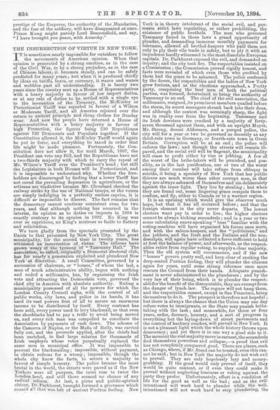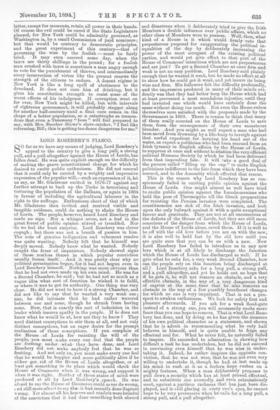THE INSURRECTION OP VIRTUE IN NEW YORK.
IT is sometimes nearly impossible for outsiders to follow the movements of American opinion. When that opinion is generated by a strong emotion, as in the case of the Civil War, or by a strong prejudice, as in the case of Chinese labour, it becomes steady, and can be safely predicted for many years ;. but when it is produced chiefly by ideas on tariffs, taxes, or currency, it waxes and wanes and wobbles past all understanding. It is barely two years since the country sent up a House of Representatives with a heavy majority in favour of low import duties, or at any rate of duties to be settled with a single eye to the necessities of the Treasury, the McKinley or Protectionist Tariff was repealed in favour of a Wilson or Moderate Tariff, and all America rejoiced over the return to anMent principle and cheap clothes for Sunday wear. And now the people have returned a House of Representatives with a licvy majority in favour of high Protection, the figures being 230 Republicans against 126 Democrats aud Populists together. If the Constitution allowed it, the McKinley Tariff would again be put in force, and everything be taxed in order that life might be made pleasant. Fortunately, the Con- stitution does not allow it, for until March, 1897, the President can veto any Bill, and the Republicans have not a two-thirds majority with which to carry the repeal of Mr. Wilson's Tariff over the President's head ; but still the Legislature in both Houses will be Protectionist, and it is impossible to understand why. Whether the free- holders are discouraged by finding that a lower Tariff has not cured the prevailing depression in agriculture, or the artisans are vindictive because Mr. Cleveland checked the railway strike by the use of National troops, or the voters are simply indulging in a. perfectly useless caprice, it is difficult or impossible to discern. The fact remains that the democracy cannot continue consistent even for two years, and that although nothing has occurred in the interim, its opinion as to duties on imports in 1894 is . exactly contrary to its opinion in 1892. No King was ever BO capricious, no King's mistress so facile to flattery and solicitation.
We turn gladly from the spectacle presented by the Union to that presented by New York City. The great municipality, for the second time in twenty years, has witnessed an insurrection of virtue. The citizens have grown weary of the tyranny of "Tammany Hall." The association, so-balled, originally 's Democrat electoral club, has for nearly a generation exploited and plundered New York ' at discretion. A small Committee, governed by a succession of chairmen, or "bosses," of whom the last, a man of much administrative ability, began with nothing and ended a millionaire, has, by organising the Irish vote and attracting the Democratic vote, governed the chief city in America with absolute authority. Ruling a municipality possessed of all the powers for which the London County Council sighs, with the control of all public works, city laws, and police in its hands, it has used its vast powers first of all to secure an enormous income to be distributed by itself. Every contract has been sold, every power used to levy blackmail, so that even the shoeblacks had to pay a trifle to avoid being moved on, and every rich man was compelled to conciliate the Association by payments of cash down. The scheme of the Camorra of Naples, or the Mafia of Sicily, was carried fully out, and the proceeds applied, after the chiefs had been enriched, to find large salaries for thousands of Irish employs whose votes perpetually replaced the same men in municipal office. It was impossible to prevent the blackmailing ; impossible, without payment, to obtain redress for a wrong ; impossible, though the whole city knew the facts, to secure a majority in favour of simple honesty. The police became the most brutal in the world, the streets were paved as if the New Yorkers were all paupers, the rates rose to twice the London level, and still there seemed no chance of any radical reform. At last, a pious and public-spirited citizen, Dr. Parkhurst, brought forward a grievance which roused &I that was left of ancient Puritan feeling. New York is in theory intolerant of the social evil, and pos- sesses strict laws regulating, or rather prohibiting, the existence of public brothels. The men who governed Tammany found in these laws a grand opportunity of plunder, and demanding immense monthly payments for tolerance allowed all brothel-keepers who paid them not only to ply their vile trade in safety, but to ply it with an impudence hardly witnessed in the most dissolute European capitals. Dr. Parkhurst exposed the evil, and demanded an inquiry; and the city took fire. The respectables insisted on a Commission ; the Commission proved rigidly honest, and facts were revealed of which even those who profited by them had the grace to be ashamed. The police confessed by the dozen, the respectables and the ladies of New York grew furious, and as the elections approached, a Purity party, comprising the best men of both the political parties, was formed, determined to bring the authority of Tammany to an end. The chief of the evil association the millionaire, resigned, its prominent members quailed before the storm, its secret managers shrank back into their dens, and although the contest was seemingly sharp, the fight was in reality over from the beginning. Tammany and its Irish devotees were crushed by a majority of forty- seven thousand against them, and with an upright Mayor, Mr. Strong, decent Aldermen, and a purged police, the city will for a year or two be governed as decently as any third-rate town in Germany, or fourth-rate town in Great Britain. Corruption will be at an end ; the police will enforce the laws ; and though the streets will remain paved, and the social evil will be flagrant, the municipality will cease to profit either by vice or jobbing. A few of the worst of the bribe-takers will be punished, and pos- sibly, as in the last purification, one or two of the worst among their number will take refuge from obloquy in suicide, it being a specialty of New York that her public thieves are much worse than other corrupt men, in that they are always ashamed of themselves and sin deliberately against the inner light. They live by stealing ; but when they are found out, some lingering grace compels them to confess, and fly, either to Canada or to a warmer region. It is an uprising which would give the observer much hope, but that it has all occurred before ; and that the foreign element in the city never departs. The lowest electors want pay in order to live ; the higher electors cannot be always kicking scoundrels ; and in a year or two some calculating suave-speaking " boss " familiar with the voting-machine will have organised his forces once more, and with the saloon-keepers, and the "politicians," and the jobbers, and the Irish and the Italians and the non. descripts, will again have collected a force sufficient to hold at first the balance of power, and afterwards, as the respect- ables retire from regular voting, to supply a clear majority. Then the old system will recommence, and if the new " bosses " govern pretty well, and keep clear of exciting the deep-seated Puritan feeling, they will plunder the citizens again for years, until some strong reformer once more rescues the Council from their hands. Adequate punish- ment is never administered to the plunderers ; and by the very law of their being, which is to plunder the respect- able foithe benefit of the disreputable, they are exempt from the danger of lynch-law. The rogues will not hang them, and the respectables cannot, except in San Francisco, bring themselves to do it. The prospect is therefore not hopeful ; but there is always the chance that the Union may one day refuse votes to immigrants, or the State may punish bribe- taking with the lash ; and meanwhile, for three or four years, order, decency, honesty, and a sort of progress in everything but the laying-down of street pavements and the control of hackney coaches, will prevail in New York. It is not a pleasant light which the whole history throws upon democracy ; and yet there is in one way a good side to it. The moment the real majority move in earnest, the scoundrels find themselves powerless and collapse,—a proof that evil has not completely conquered good. There are places, such as Chicago, where, if Mr. Stead can be trusted, even this can- not be said; but in New York the majority do not wish evil to prevail. They are only hopelessly lazy and money- grabbing. If the good would only prevail of itself, they would be quite content, or if even they could make it prevail without neglecting business or voting against the party they prefer. Unfortunately, effort is a condition of life for the good as well as the bad ; and as the evil- intentioned will work hard to plunder while the well- intentioned will not work hard to stop plundering, the latter, except for moments, retain all power in their hands. Of course the evil could be cured if the State Legislature pleased, for New York could be admirably governed, as Washington is, by a small Commission of paid nominees ; but that would be contrary to democratic principles, and the great experiment of this century—that of governing the wise by the foolish must be fairly tried. It may even succeed some day, when the taxes are thirty shillings in the pound ; for a foolish man crushed with taxes is sometimes a man angry enough to vote for the punishment of thieves, and intermediately every insurrection of virtue like the present renews the strength of the citizens to endure. A deeent regime in New York is like a long spell of abstinence to the drunkard. It does not cure him of drinking, but it gives his constitution strength to resist some of the worst effects of his indulgence. If corruption went on for ever, New York might be killed, but with intervals of righteous government, it will probably stagger along for another half-century until a final cure comes in the shape of a better population, or a catastrophe so tremen- dous that even a Tammany " boss " will feel prepared to say, with Mrs. Beecher Stowe's slave-catcher, "I feel like reforming, Bill; this is getting too damn dangerous for me."







































 Previous page
Previous page